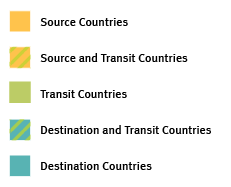


Madudeva N. was 17 years old when he fled Sri Lanka and arrived in Indonesia.
“I left Sri Lanka in fear of abduction by the Karuna group… We were abducted [Madudeva and four friends]. They kept us in detention for two weeks. Then my father gave money to the Karuna and I was released…. [One year later] I left Sri Lanka… The Karuna had called and asked for money again…. I left Sri Lanka and went to Malaysia by airplane. I stayed in Malaysia for three days. I paid 300,000 Sri Lankan rupees (around USD$2,363) to the agent for the transit.”
Human Rights Watch interview with Madudeva N., Medan, August 23, 2012.
Arif B., an Afghan boy, was 15 years old when he arrived in Indonesia.
“It cost $7,000 to get here…. I got the money from my brother who lives in Australia.”
Arif described trying to reach Australia:
“I went by air from Jakarta to Banjarmasin. There we got on a boat. It’s a long trip, 15 days and nights to get to Australia. After seven nights… the captain lost his way. They asked for help from a cargo ship that was passing…. The cargo ship, took us to the police…. [I spent] one month and twenty days detention at Balikpapan. Then I was taken to Kalideres [IDC].”
After leaving Kalideres IDC, Arif attempted find his way to Australia by boat again.
“I’ve made many attempts to go. In December 2011, I was on a boat that went down. 200 people died…. We spent eight hours on the boat before it was in trouble, then three nights floating in the boat while it was sinking down…. For three days and nights, no water and food. We kept climbing higher and higher as the boat was sinking.”
Human Rights Watch interview with Arif B., Cisarua, August 30, 2012.
Fartuun A., a Somali asylum seeker, traveled to Indonesia with her sister, brother in-law, and their four children in 2011.
“Ten years ago we left Somalia and went to Yemen. We flew to Jakarta one year and three months ago, all together. It cost $1,000 each. We paid a smuggler and used fake passports. We had to leave because of the war in Yemen.
“The smuggler said that he would take us to Australia, but then in Indonesia he disappeared…. In Jakarta he took us to a hotel, we stayed the night, and then in the morning he was gone. Eventually [my brother-in-law] found a Somali man and arranged for us to come here [to the migrant communities outside Jakarta].”
Human Rights Watch group interview with Fartuun A., Cisarua, September 7, 2012.
Karim Ali S., a 34-year-old man from Burma, traveled to Indonesia with his wife and two cousins, aged 29 and 24 years old. He and his wife have since had a son who was five months old when the family met with Human Rights Watch.
“We left Burma on September 20, 2011. We wanted to go to Australia. We went through Malaysia. [After several months there], we paid 10,000 Malaysian ringgit (around USD$3,200). We were three days and two nights on a boat [from Malaysia]… The agent stopped on an island… we didn’t know where we were. The agent rented a house, and we all stayed five days and the agent disappeared. He had only paid rent for one week so we got kicked out. We asked the house owner to arrange for us to go to Jakarta. We sold our jewelry to pay for the ticket.”
Human Rights Watch group interview with Karim Ali S., Ciawi, September 7, 2012.
Labaan A., a Somali boy, was 17 years old when he set out for Indonesia.
“I left home in Somalia in January of 2011…I hired a smuggler from Somalia. I paid around $5,000 USD. There was a bad war and I was living with my mother. I wanted to go to Australia.
“When I got to Malaysia, the smuggler left me. I came to Medan. I found an Afghan smuggler [Afghan man, who smuggles people] who flew me to Jakarta. I was in the airport alone... I asked the taxi driver to take me to where the Africans live and he did. The Africans I met in Jakarta took me to UNHCR [the UN refugee agency]….
“I don’t have enough money for the boats [to Australia]. They cost minimum USD$7,000…. Once I got on a boat for free with some others, but it was bad and flipped over. The Indonesian fishermen found us. They took us to land and the police arrested us. They kept us in a hotel… for 25 days.”
Human Rights Watch interview with Labaan A., Cisarua, September 7, 2012.
Rafiq A., a Burmese Rohingya boy, described his unaccompanied journey to Indonesia in February 2011 when he was 14 years old.
“We had a lot of problems in Burma. The army would recruit children, boys, to work and build roads and do other things…. we had no freedom. If we move around, they say, ‘Muslim! Terrorist!.... My parents thought I was in danger so they told me to leave….
“The boat ride was long-18 days and nights. We arrived in Thailand… the Thai navy took our boat motor and our food and put us in the sea. …. We had some bamboo and some plastic tarpaulins, so we made a sail. We traveled for three days like that. In the sea we saw a fisherman’s boat. He guided us to Aceh. Police arrested us.”
Rafiq was then detained for one month and fifteen days, in a hotel used as an informal detention facility and guarded by police.
“All day every day the door was locked. The police gave us some food.”
Human Rights Watch interview with Rafiq A., Medan, September 13, 2012.
Ahmad Z. was 17 years old when he left Afghanistan and arrived in Indonesia.
“I found a smuggler in Kabul. I got smuggled to Pakistan and then to Malaysia. It cost me around $7000 [to get to] Malaysia….
“I stayed in Malaysia for 10-12 days in a hotel. I met other people going to Indonesia. I took a boat to Indonesia with them. It was four hours long and we landed in Sumatra. The smuggler’s contact met us in Indonesia and took us to his house. We stayed one or two days there…. He sent us to another place in Sumatra, and we spent three months there. Every day he would come and tell us ‘oh tomorrow I will send you [to Jakarta].’ We couldn’t go outside at all.
“One day he dropped us at the Padang airport. All 12 Afghan Hazaras [eleven adults and one child]. We were caught in the airport by the police. They said ‘where are you from?’ I said ‘Afghanistan.’ They took us to the immigration office in Padang for 20-25 days. There were twelve people in two small rooms. We never went outside…. I told the police I was 17. They just put me with the others, and treated me like the others.”
Human Rights Watch interview with Ahmad Z., Yogyakarta, September 18, 2012.
Faizullah A., an unaccompanied Afghan boy who had been living in Pakistan, was 17 years old when he reached Indonesia.
“I went from Quetta to Lahore. Then with someone else’s passport I went by plane to Thailand, and transited there to Kuala Lumpur. In Malaysia, I then went… to Koiching in Malaysia by plane, and then we walked to Kalamantan, in Indonesia. By foot.
“It cost $12,000. I paid it all in advance, before I left. I got the money [from family] in Afghanistan. I was trying to go to Australia, because they accept refugees.
“In Kalamantan, we stayed in a smuggler’s house for ten days. Then the police caught us. They came to the house and asked if we had documents…. I told the police I was 17 years old. They said, ‘it’s no problem for us, you still go to detention.’”
Faizullah was taken to Pontianak IDC and detained with unrelated adults for seven and a half months.
Human Rights Watch interview with Faizullah A., Medan, August 25, 2012.
Azim M., an Afghan refugee aged 17, traveled to Indonesia alone.
“I’m from Kabul. I left one and a half months ago. I went to Dubai, then flew to Jakarta. When I arrived in Jakarta, the smuggler took my money and let me go. There were a few other people; we took a car [taxi] together and came to Bogor…. I came to Indonesia because I wanted to go to Australia. I had an agreement with the smuggler that he would bring me to Australia. He promised that after one month he would take me, but nothing has happened.”
Human Rights Watch interview with Azim M., Cisarua, September 9, 2012.